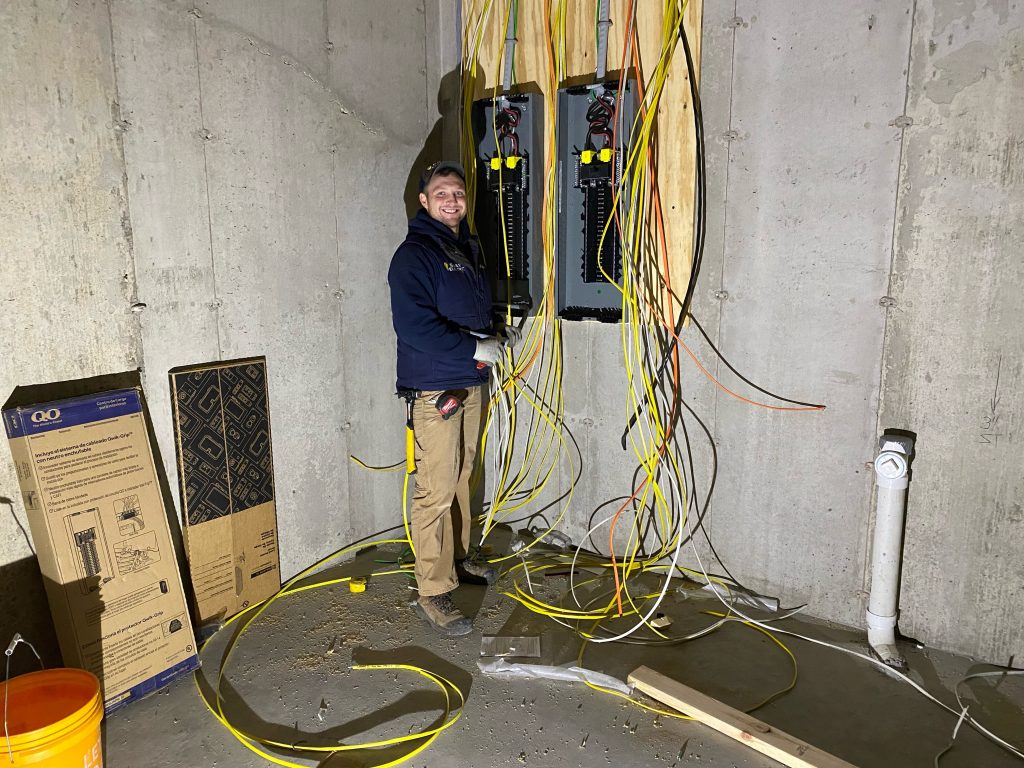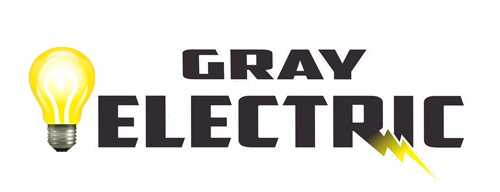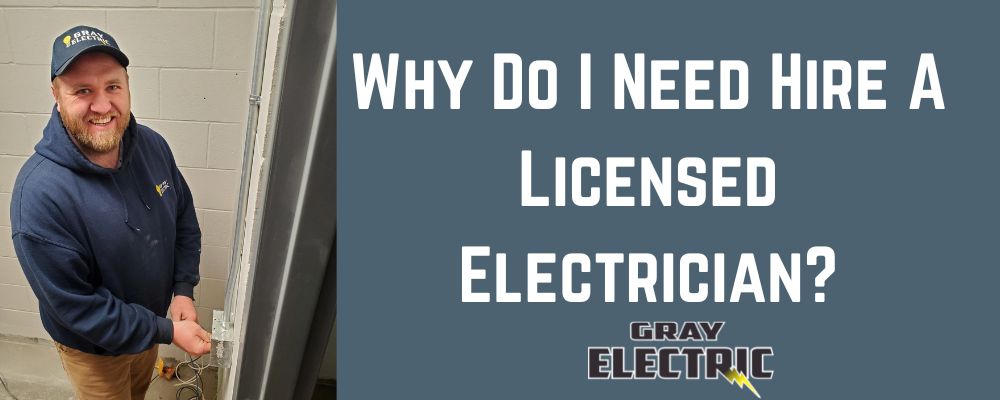Perhaps there are times where you’ve looked at an electrical job and wondered whether you should use a licensed electrician, or do it yourself. On the surface, the attraction of “saving a few dollars” may seem rather attractive.

With the help of Google and a YouTube video or two, you’ll even find all the instructional videos you need, that appear to give you what you need to know.
However, there are some important factors to consider, when entertaining who should be the one to work on your electrical repairs and installations.
Otherwise, what appeared to be a saving, could well become the opposite.
Make sure you understand the difference between a licensed electrician and one that isn’t. The consequences that come with poor electrical work include things like faulty wiring and fires. There’s nothing more devastating than having your home burn down and the insurance company refusing to pay because you used an unlicensed electrician!
DIFFERENT TYPES OF ELECTRICIAN LICENSING
Did you know that there are different types of electrician licenses depending on the set of skills and knowledge possessed? It is important to understand what license your electrician has and what that license enables him to be able to do. All licenses in the United States can be either certified, meaning that they are able to work anywhere in the state where the license was obtained, or registered, meaning they are only allowed to work in the specific region they were registered in. The four different types of licenses are:
- Electrical Contractor (Certified or Registered)
- Electrical Specialty Contractor (Certified or Registered)
- Alarm Contractor I (Certified or Registered)
- Alarm Contractor II (Certified or Registered)
Doing work outside of the scope which the electrical license stipulates is actually against the law. So, make sure you’re keeping things legal to protect you from insurance that won’t pay out because you didn’t think to ask to see your electricians license.
HOW TO BECOME A LICENSED ELECTRICIAN
Your typical average Joe can take the electrical licensing examination, but this is easier said than done! Passing this examination requires an in-depth knowledge and understanding of the National Electrical Code. The National Electrical Code is a set of standardized guidelines adopted for the United States for the installation of electrical wiring and the operation of equipment and tools that may be needed on the job. Just remember that, while this guideline is accepted in the country, there are small differences from state to state. In order to be licensed, and an electrician also needs to gain electrical work experience for a certain number of years as an electrician apprentice working for a company or with a licensed electrician. This can range anywhere from 3 to 6 years’ worth of working experience depending on the type of work done
The Benefit of Your Electrician’s Expertise
Like many areas, the trouble with attempting DIY electrical work is, “you don’t know, what you don’t know”. What may seem like a good or logical way to do things, could create inefficiencies or problems with overloading circuits, etc.
From selecting the right electrical equipment for your current and future needs, helping you prevent tripping circuits and early identification of potential hazards, your electrician’s expertise can help you save a lot of distress and wasted money in the long run.
WHY IT IS IMPORTANT TO HIRE A LICENSED ELECTRICIAN
It is important to make sure that your electrician is licensed, not only to ensure that there is quality work being done to your wires, but also for a host of other reasons. Being licensed means that an exam has been passed and the necessary qualifications to do the work is guaranteed. Also, most electrical work needs to be done with a permit. This means that liability insurance and homeowner’s insurance are more likely to pay out in the event that something bad happens on the job or after a job has been done. Cities just don’t hand out permits to unlicensed electricians. Finally, being licensed means that the electrician will work according to the safety guidelines stipulated by the National Electrical Code. While this does not mean that an unlicensed electrician isn’t safe, it just means they have nothing to lose it they’re not. Remember, it’s better to be safe than sorry.
Ensuring You’re Protected by Insurance (and not voiding yours)
Using a qualified electrician, provides additional benefits for you when it comes to insurance. As part of their licensing, your electrical contractor must be insured. This is to protect you, your property and anyone who uses the electrical systems or equipment on your property, in the event something goes wrong.
Further to this, your home insurance policy, likely requires that all electrical work be conducted by a licensed and insured electrician. In the event of a fire or accident, if the cause was linked to electrical work which wasn’t completed by a licensed electrician, your policy could potentially be void… leaving you effectively uninsured and out of pocket for the repairs.
Hopefully you’ve realized that, if you need some wires fixed or installed, having a licensed electrician really covers you in the long run!
We’re committed to ensuring that you receive quality electrical works and advice. If you’ve got any questions, we’d much rather a phone call, then have you unnecessarily risk the safety of you or your family.
If you need the service of a fully-qualified, licensed electrician, or are interested in the electrical services we offer, give us at Gray Electric a call today! Stay safe, be smart, and enjoy the peace of mind of only using a suitably insured and licensed electrician for your property.



 Make learning about electrical safety fun! Each season of the year has unique fire and electrical safety dangers that are related to common seasonal activities. The 4 Seasons of Safety program includes tips, lessons and activities that help students learn about basic fire and electricity concepts while also providing critical safety information that helps them learn to identify and prevent the fire and electrical safety hazards. We also encourage you to
Make learning about electrical safety fun! Each season of the year has unique fire and electrical safety dangers that are related to common seasonal activities. The 4 Seasons of Safety program includes tips, lessons and activities that help students learn about basic fire and electricity concepts while also providing critical safety information that helps them learn to identify and prevent the fire and electrical safety hazards. We also encourage you to 







